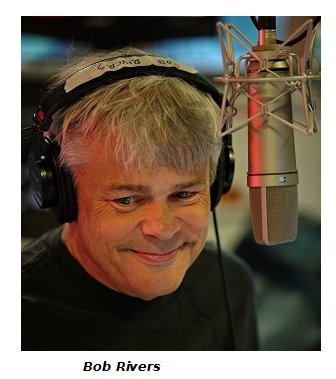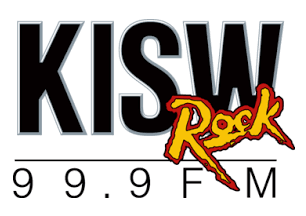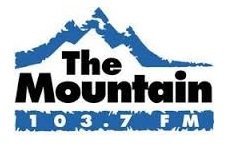This article originally appeared in the Seattle Times Sunday, January 22, 1995 / By Chuck Taylor
[Some photos may be more recent]
A MAN IN THE MIDDLE OF the Seattle morning commute dials his car phone to request a song.
He thinks he is punching the request line at radio station KPLZ-FM, which plays “adult-contemporary” hit music. But he misdials and gets the request line for KZOK-FM, which plays “classic” rock.
 In KZOK’s control room, Robin Erickson, probably the best-known woman in Seattle radio, taps a button. A reel-to-reel tape recorder behind her clicks into action. Then she answers the request line.
In KZOK’s control room, Robin Erickson, probably the best-known woman in Seattle radio, taps a button. A reel-to-reel tape recorder behind her clicks into action. Then she answers the request line.
“Hi, KZOK.”
“Is this Star?” the guy in the car asks.
Erickson replies in her best imitation of a perky radio hostess, something she most definitely is not. “That would be Star 101.5!” she says, referring to the other station’s nickname. “Why, yes it is!”
The man requests a song no one at KZOK would be caught dead playing. Erickson does not let on. She chats with the caller, easing into her trademark cynicism and sexual innuendo: “Hey, do you ever wax your legs? Yeeessss, that’s just one of the many questions we ask here at Star 101.5!”
Dumb phone calls are frequent enough that Erickson and on-air partner John Maynard make them a regular feature on KZOK. After the tape is rewound and ready for broadcast, the unidentified caller’s conversation with Erickson is introduced by a reverberating announcer’s voice that intones: “Who dares scale the KZOK Wall of Ignorance?!”
Every day, plenty of callers dare scale the walls of ignorance and genius that define morning-drive radio. But they are a minuscule minority, mere fodder to entertain a more-important group – the estimated 2.1 million other people, 80 percent of the population of metropolitan Seattle-Tacoma, who listen to radio on weekdays between 6 and 10 a.m.
Among about three dozen stations in the market, there are plenty of sober broadcasts for so-called thinking people. You know the names and call letters – the serious or cordial news and talk stations everyone at your office says they listen to. And well they might, at least long enough to become versed in the state Legislature or Bosnia or the O.J. Simpson case.
Wait, scratch that. If they want to be well-versed in the Simpson case, or any current event that would have seemed ridiculously implausible a year ago, they probably are also sneaking a listen to one of a dozen or so half-crazed Seattle morning-radio shows whose credo is: “Seriousness sucks!”
Drive time is prime time, and people want to be amused behind the wheel. With competition in all the music formats red-hot, stations more than ever have to make an impression. So morning listeners are hearing voices, hearing stories, hearing pranks, hearing cranks. Creative anarchy is alive and well in the otherwise calculated, researched-to-death radio business.
While there are a lot of talented people at stations all over town, it might not be any crazier right now for disc jockeys than in rock radio, where a game of musical chairs recently ended.
Three of the four rock stations now employ expensive morning personalities who rise by 4 a.m. and manage to be hilarious by 6. They regularly push the boundaries of good taste. It might seem like they are out of control. But a button-down business strategy sanctions their madness, and they could be fired in a wink if someone decided “things just aren’t working out.” All in all, morning-radio personalities aren’t like you and me.
AS A MASS MEDIUM, radio might be the easiest to break into and is instantly gratifying to the ego. No matter how bad or inexperienced you are, someone at one of the 11,700 radio stations in the country will hire you. You might have to settle for celebrity status in Forks, or in Walla Walla, but someone will hire you. It’s up to you if you want to be truly famous. Set your sights on Spokane. Maybe from there you can make it to the big time – Seattle! Along the way, expect to be fired as quickly as you are hired. That’s radio.
 Bob Rivers started in such a way in New England, eventually landing in Baltimore, where – tuh-dah! – he was fired.
Bob Rivers started in such a way in New England, eventually landing in Baltimore, where – tuh-dah! – he was fired.
“I call that the flash-and-burn phase of my life,” says Rivers, who boyishly looks none the worse for wear, save for some gray hair. “I got successful way too fast, made money way too fast and spent it in the wrong ways, and my ego got way ahead of my talent.” Big-city morning personalities make up to several hundred thousand dollars a year, sometimes more.
But Rivers landed a job in a bigger market and cleaned up his off-the-air act. He’s been a morning guy for five years now at Seattle’s top-rated electric-guitar station, KISW-FM, which plays head-banging, chainsaw rock ‘n’ roll.
Almost no one else involved in Rivers’ morning show got into radio the small-town, dues-paying way. The result is a decidedly Everyman sound. Each weekday morning, a crew of a half-dozen or so paid and unpaid characters and hangers-on crowds the studios in a modest two-story office building on Aurora Avenue North to conceive and edit one of the most original – and most risque – radio shows in town.
“They’re real people,” says 24-year-old listener Dan Lancaster, a Microsoft employee who lives on Mercer Island. “They remind me of everyday guys. Guys I’d hang out with.”
Everyday guys they are. Jamie “Spike” O’Neill, who reads handwritten sports reports and does many of the character voices, was selling cars and tending bar in Baltimore – “perfect training for radio” – when he got his break by calling to complain about one of Rivers’ song parodies. And Rivers met “Downtown” Joe Bryant, the laid-back-sounding producer, at a latte stand in Seattle.
“Big Dave” Caldeira, who provides production support behind the scenes, is the son of Rivers’ landscaper and just graduated from Mount Si High School last year. Engineer Brad Cash, who runs the music CDs and commercials in the control room, is a former “backstage pass” guest (a few listeners every day are invited to hang out in the studio) and still does construction work on the side.
“I’m really an ensemble player” Rivers says. “If you put me in a radio booth by myself, I’m pretty boring. I’m like a gang leader, only we don’t do drive-by shootings – we do drive-by joking.”
The result is plenty of impromptu topical humor along with the usual phone pranks and pointedly bawdy interviews.
Some of the material, like “God’s Weather” (“I shall make it rainy today, and there will be snow in thy mountains . . .”), is sacrilegious by the standards of some folks, even though His Holiness always manages to humble the radio personalities who are blessed by his daily appearance on “Twisted Radio.” Other material – “Win-A-Girl Wednesday,” for example – might be regarded as sexist. But all of it is fitting for KISW’s target audience, 18-to-34-year-old males.
The trademark of KISW’s “Twisted Radio” show is a growing library of commercial and rock-song parodies produced in a 24-track recording studio in the basement of Rivers’ home in the Cascade foothills.
The Chicago lyrics, “Does anybody really know what time it is?” become, “Does anybody really know where Bosnia is?” Eric Clapton’s “I Shot the Sheriff” is transformed into “I shot the White House – but I did not hit the pres-i-dent . . .” And so on.
Rivers produces the sound-alike songs but gets plenty of voice help from O’Neill and others. For several years, their Christmas-oriented song parodies have been available nationally in record stores, and now so are the topical ones. “Twisted Radio” has sold several hundred thousand CDs or tapes, and the material is being syndicated nationally for use on morning shows elsewhere.
Steve Young, KISW’s program director, says the investment of effort and air time in such elaborately produced work and clever chatter is worth it – even at a station whose slogan is “More pure rock, no useless talk.” Such spontaneity works even at a station that, like others, tests songs on auditorium-sized focus groups before adding them to the “playlist.”
“To me it’s always, `How can we get them to listen just 15 minutes longer?’ ” Young says. “There are dynamics beyond the music we play at work here. I think personality, if anything, will become even more important” as radio faces increasing competition from other media.
“Twisted Radio” seems to be wildly successful for KISW. During last summer’s ratings period, the most recent available, the station was No. 1 in the morning among 18-to-34-year-olds of both genders. The other rock station that goes after those listeners, modern-alternative KNDD-FM, stays true to music in the morning and is third, behind country KMPS-FM-AM.
KISW also does surprisingly well with another group, better than you might think given the station’s abrasive music. Among the 25-to-54-year-old listeners coveted by advertisers, KISW is No. 3 in the morning behind news-talk KIRO-AM and country KMPS.
Young attributes success with the older demographic group to listeners who are willing to sit through a dose of AC/DC or Aerosmith because they want to hear Rivers and company. “We have a lot of those in the morning,” Young said. “They hate the music we play.”
Donna Smyth, a 35-year-old postal worker who lives in Snohomish, isn’t wild about the music on KISW but listens to “Twisted Radio” with headphones every morning at the post office in Edmonds. So do four or five of her co-workers. “The whole office can be dead quiet,” she says, “and then we’ll all burst out laughing.”
KISW is the king of the rock pile. For now.
 KMTT-FM-AM WOULD LIKE to be where KISW is. It is nicknamed “The Mountain” and its slogan is “quality rock, true variety.” KMTT’s adult-album-alternative format is known in the business as AAA. It’s an eclectic mix of blues-rock, folk-rock and just plain rock-rock, and it attracts an educated and affluent audience.
KMTT-FM-AM WOULD LIKE to be where KISW is. It is nicknamed “The Mountain” and its slogan is “quality rock, true variety.” KMTT’s adult-album-alternative format is known in the business as AAA. It’s an eclectic mix of blues-rock, folk-rock and just plain rock-rock, and it attracts an educated and affluent audience.
So far, KMTT and other AAA stations around the country have been content with middle-of-the-pack ratings. KMTT last summer was ranked 10th among 25-to-54-year-olds during morning drive. The fact Mountain listeners are better-to-do and listen longer than the audiences of most stations offsets to some degree that so-so performance.
KMTT program director Chris Mays and general manager G. Michael Donovan are ambitious. While KMTT’s TSL – “time spent listening” – is high, they want to boost the station’s “cume,” the total number of people The Mountain reaches.
“How can we increase the cume without wrecking this beautiful thing we’ve created?” Mays asks rhetorically.
One way is to rock a little harder, adding Nirvana and Pearl Jam to the mix of Sarah McLachlan and Toad the Wet Sprocket.
And you hire “a larger-than-life morning show that talks to a more diverse group of people,” Mays says.
In the control room at KMTT, in the “canned ham” Metropolitan Park West building downtown, producer John Lucarelli is giving Gary Crow and Mike West a hard time about what an easy job they have. Crow’s head is vibrating slightly from side to side like a metronome as he launches into his best Sammy Davis Jr. impersonation.
“Babe,” says Crow, his penetrating eyes twinkling with hyperbole. “Babe, the pressure alone is a killer. We’re in a war here.” His voice is rising. “People are going to lose jobs here in morning radio!”
Someone in the market will indeed get canned sooner or later. Crow knows. He was fired a few years ago from his last job, from now-defunct rock station KXRX-FM, apparently in a cost-cutting move – even though he helped that station make pretty decent dough over the years. It was a bad time to get fired. He had to sell the house he was building and regroup financially.
Off the air, Crow is a disc jockey’s disc jockey, filling a room with one-liners, talking back at the commercials and hamming it up with the voices of characters he has encountered. On the air he is the opposite, a smooth professional whose measured, laid-back wit belies his years in the rowdy rock-radio biz.
Partner West is the opposite of Crow – soft-spoken, maybe even shy off the air. But when the microphone is on, West is animated and assertively funny, and he has the gift of a malleable voice that does impersonations and dialects.
West worked with Crow at KXRX before The X fired Crow. West was out of work recently himself, beginning last spring when The X became “Young Country” KYCW-FM.
Soon after Crow was let go by KXRX, he landed the afternoon shift at KMTT. West joined him on the morning show in October. They displaced John Fisher, who now does the afternoon show, and Peyton Mays, the program director’s husband, who is working outside radio for now.
The radio business is full of connections. Crow and West worked with KZOK’s Erickson and Maynard at KXRX, a station that was rich in talent but adrift musically, which caused it to fail. Before KXRX, Crow and West and Erickson and Maynard all worked at KISW. Now they are drive-time competitors.
Crow grew up in the Tri-Cities of Kennewick, Richland and Pasco. Before moving into FM rock in the 1970s, he worked at Top 40 KTAC-AM in Tacoma, which is now KMTT-AM.
West is from Seattle and got his start in the ’70s at KNHC-FM, the radio station run by students of Nathan Hale High School. When he was young, he played with a clunky reel-to-reel tape recorder, doing sound effects and using it for prank phone calls. “I couldn’t figure out why my friends didn’t want to do it all day long,” West says. “Now I do the same thing and get paid for it.”
Crow and West made their mark much the way Bob Rivers at KISW did, with skits, phone pranks and fake commercials, like the one for the Used-Food Restaurant. (“Come on in! You ain’t gonna die or nothin’!”) West would like gradually to bring back some of the old material, like maybe the-yuh, caricature of the-yuh, over-enunciating sports commentator, Dick Ball, whose voice is deeper than, eeyuh, orca doo-doo.
But Crow and West have been going easy on the Mountain’s sophisticated listeners so as not to shock them with an avalanche of studio-produced juvenile jokes. Donovan and Mays would like them to concentrate on ad-libbed topical humor. They’re pretty good at that, too, and there’s chemistry in their chit-chat.
In coming to the station first, “Gary convinced us that a guy could move over (here) from a `Wayne’s World’ album-rock station,” Donovan says. “We’re reinventing Crow and West. After all, Mick Jagger and Charlie Watts don’t trash hotel rooms anymore.”
Still, Crow and West aren’t exactly singing “Michael rowed the boat ashore . . .”
“On the Wednesday Crow and West morning road show: The turkey, from farm to table,” says West a few days before Thanksgiving. “How does it happen? We’ll talk to a spokesman from Acme Poultry. Mmmm, can’t wait for the big bird! See you in the morning.”
The next day, West’s cousin at the poultry farm explains over the phone, in monotone, in clinical detail, how turkeys are slaughtered in assembly-line fashion. A Mountain listener later calls to say she and her family were considering becoming vegetarians – and that the interview on KMTT cinched it.
In a perverse way, Crow and West have connected with the Birkenstock-inclined core audience of The Mountain.
SO THE MOUNTAIN is converting KXRX refugees Crow and West into metaphorical vegetarians. What about their friends over at KZOK?
Not much has changed for comedy carnivores Robin Erickson and John Maynard since KXRX days except their address, now an office building in Seattle’s Lower Queen Anne neighborhood.
They still claim to hate each other. The show still feeds on that causticity. Callers who think they can out-wisecrack them are dead meat.
“Robin and Maynard, the loving years – at KZOK-FM, the classic-rock station,” Erickson says pleasantly and ironically between songs.
Actually, it’s not all sarcasm. There’s an innocent bent, too. Theirs is still among the noisiest morning programs, with a junk closet full of sound effects and arcane phonograph music that makes the show sound like someone’s – maybe Maynard’s – 1950s childhood flashback. Maynard grew up in Pullman, Erickson in Spokane.
Many of the old KXRX characters are still with them. There’s Roy Otis, the endearingly obnoxious kid with the scratchy voice who disrupts phone interviews with embarrassing questions. Officer Lee Groinman, the snickering, psychosexual cop who has a nightstick fetish, still checks in occasionally.
No siree Bob, no one’s going to reform Robin and Maynard. Who would want to? Everyone knows the opinions expressed on their show do not necessarily reflect those of the staff and management of KZOK, who pretty much leave them alone.
“We had an agreement from the get-go that I wouldn’t try to micromanage them – or manage them at all,” says program director and rock-radio veteran Steve Slaton. “They’re unmanageable anyway. I accept that! They’re the first to know when something lays an egg, and they don’t need anyone telling them.”
The unmanageable Robin and Maynard aren’t for everyone. But if you find yourself in a cynical mood on the way to work, they might have your kind of radio show. Everyone is fair game.
When a listener called to ask what happened to former KZOK morning man Gary Lockwood, himself a Seattle radio legend who made his mark at KJR-AM in the 1970s and ’80s, Erickson told the caller over the air that Lockwood was fired for violating KZOK’s rule against playing the same song twice in the same day. What really happened was no less awkward, far less logical and not an atypical radio business decision.
Lockwood had great ratings. Last summer he and sidekick Bob Hovanes were in fourth place among 25-to-54-year-olds, nearly tied with No. 3 KISW. Among 18-to-34-year-olds, a demographic group a classic-rock station isn’t really expected to embrace, KZOK in the morning was fifth, right behind Top 40 KUBE-FM.
Last summer, Virginia-based EZ Communications bought KZOK for $20 million, a figure that’s startling even considering the station’s solid track record in recent years. EZ also owns top-rated country station KMPS.
As Slaton explains it: “The decision wasn’t arrived at easily because Gary was performing well, but it was felt that Robin and Maynard would be able to take the station to greater heights.” In October, Lockwood was out.
He has been spending a lot of time in Florida this winter and just might stay there for the good of his golf game. He is pretty bitter about KZOK and about radio in general on the one hand. On the other hand, Lockwood says with a shrug, “It’s their radio station.
 “When I left KJR, I didn’t need to go back, but I wanted to prove a point, and with the ratings success at KZOK, I think I did prove my point. I guess it was good going out on top.
“When I left KJR, I didn’t need to go back, but I wanted to prove a point, and with the ratings success at KZOK, I think I did prove my point. I guess it was good going out on top.
“Maybe I’ll go to a small-market radio station. Some of the best times I had were at small-market radio stations, working my way to the top. I don’t know, maybe I was happier making $30,000 a year rather than $300,000.”
What, is he joking? Maybe. Probably.
But, “I know what the business is all about,” says Lockwood. “You’re here one day and gone the next.”
Which is something all disc jockeys come to terms with eventually, allowing them to do crazy things without fear of failure. It’s kind of a simulated impunity.
Lockwood’s fate doesn’t seem to faze Erickson or Maynard, even though some think they have a hard ratings performance to follow. Plus, there’s growing competitive pressure from upstart ’70s-hits KJR-FM, whose morning team, Charlie Brown and Ty Flint, is simulcast on KUBE and was instantly in the ratings hunt.
“The only pressure honestly that we both feel comes from both of us,” Erickson says. Back in the KZOK control room, she and Maynard call some guy named Dave at the National Weather Service. After he gives a brief forecast live on the air, Erickson puts some pressure on him:
“And Dave, you’re on your favorite radio station, which is what? Huh, Dave? The pressure’s on.”
“Uh. I don’t remember.”
[Copyright (c) 1995 Seattle Times Company] Chuck Taylor has worked as a disc jockey in the Tri-Cities, Walla Walla and Moscow, Idaho. Since late 2010, he has worked as an editor at The Daily Herald and HeraldNet.com in Everett. He was the founding editor of Crosscut.com in Seattle, and has worked as managing editor of Seattle Weekly.
Roy Otis aircheck [John Maynard]
Check our AUDIO section for fabulous soundgasms for your ears!



Some comments may be held for moderation. (New users)